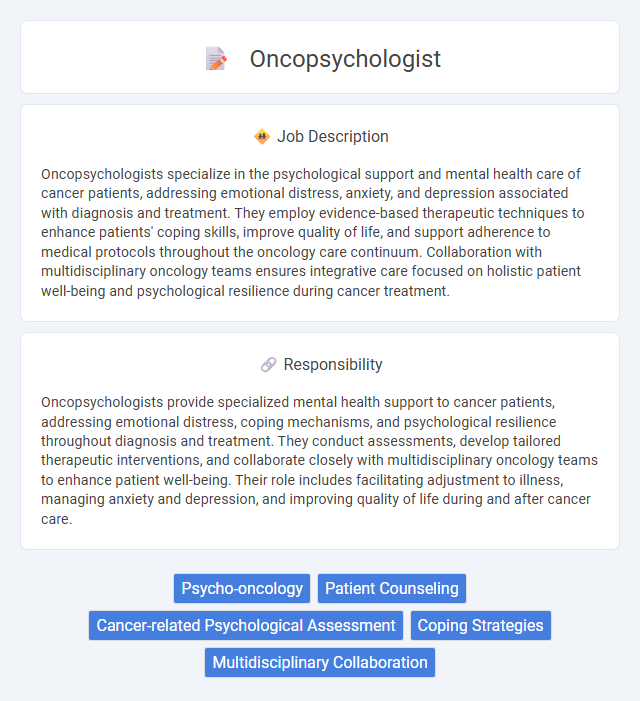
Oncopsychologists specialize in the psychological support and mental health care of cancer patients, addressing emotional distress, anxiety, and depression associated with diagnosis and treatment. They employ evidence-based therapeutic techniques to enhance patients' coping skills, improve quality of life, and support adherence to medical protocols throughout the oncology care continuum. Collaboration with multidisciplinary oncology teams ensures integrative care focused on holistic patient well-being and psychological resilience during cancer treatment.
Individuals who possess strong empathy and emotional resilience are likely to be well-suited for a career as an oncopsychologist, given the emotional challenges faced by patients dealing with cancer. Those who thrive in supportive roles and have a genuine interest in mental health and oncology may find this profession fulfilling and appropriate for their skills. Conversely, people who struggle with managing high levels of stress or emotional strain may find this job demanding and less suitable.
Qualification
An oncopsychologist requires advanced education in psychology, typically a doctoral degree (Ph.D. or Psy.D.) specializing in clinical or counseling psychology with a focus on oncology or health psychology. Certification or licensure as a clinical psychologist and specialized training in psycho-oncology are essential for providing mental health support to cancer patients. Strong knowledge of cancer treatments, psychological assessment, and therapeutic interventions tailored to oncology patients enhances their effectiveness in addressing emotional and psychological challenges associated with cancer diagnosis and treatment.
Responsibility
Oncopsychologists provide specialized mental health support to cancer patients, addressing emotional distress, coping mechanisms, and psychological resilience throughout diagnosis and treatment. They conduct assessments, develop tailored therapeutic interventions, and collaborate closely with multidisciplinary oncology teams to enhance patient well-being. Their role includes facilitating adjustment to illness, managing anxiety and depression, and improving quality of life during and after cancer care.
Benefit
Oncopsychologists are likely to provide significant emotional support and coping strategies to cancer patients, which may improve their overall quality of life. Their work probably reduces the psychological distress associated with diagnosis and treatment, potentially enhancing patient outcomes. Collaborating with medical teams, oncopsychologists could contribute to more holistic care, benefiting both patients and healthcare providers.
Challenge
Oncopsychologist roles often involve navigating the complex emotional landscapes of patients coping with cancer, which can present significant psychological challenges. The probability of encountering high-stress situations is substantial, given the need to support individuals facing life-threatening illnesses and grief. Managing these challenges requires a combination of empathy, resilience, and advanced therapeutic skills to provide effective mental health care.
Career Advancement
Oncopsychologists play a crucial role in supporting cancer patients' mental health through specialized therapeutic interventions. Career advancement opportunities in this field often include leadership roles in clinical settings, research positions, and academic appointments centered on psycho-oncology. Obtaining board certification and pursuing advanced training in oncology-related psychology enhance prospects for professional growth and higher earning potential.
Key Terms
Psycho-oncology
Oncopsychologists specialize in psycho-oncology, addressing the psychological, emotional, and social challenges faced by cancer patients throughout diagnosis, treatment, and survivorship. They provide evidence-based interventions to improve mental health outcomes, coping strategies, and overall quality of life during complex oncological care. Expertise includes grief counseling, stress management, and support for families navigating cancer-related distress.
Patient Counseling
Oncopsychologists specialize in providing patient counseling tailored to individuals coping with cancer diagnoses and treatment challenges. They employ evidence-based therapeutic techniques to address emotional distress, anxiety, and depression, enhancing patients' mental health and quality of life. Effective communication and empathetic support facilitate patients' adjustment to illness and adherence to medical regimens.
Cancer-related Psychological Assessment
Oncopsychologists specialize in cancer-related psychological assessment to evaluate the emotional, cognitive, and behavioral impacts of cancer diagnosis and treatment on patients. They utilize standardized tools and clinical interviews to identify anxiety, depression, and coping mechanisms, guiding tailored interventions for improved mental health outcomes. Their expertise supports multidisciplinary oncology teams by providing critical insights that enhance patient-centered care and quality of life during the cancer journey.
Coping Strategies
Oncopsychologists specialize in developing coping strategies that help cancer patients manage emotional distress, anxiety, and depression during treatment. They employ evidence-based interventions such as cognitive-behavioral therapy, mindfulness techniques, and stress reduction exercises to improve patients' psychological resilience. By facilitating adaptive coping mechanisms, oncopsychologists enhance overall quality of life and support patients' mental health outcomes throughout the cancer journey.
Multidisciplinary Collaboration
Oncopsychologists play a crucial role in multidisciplinary collaboration by working closely with oncologists, nurses, social workers, and rehabilitation specialists to address the psychological and emotional needs of cancer patients. Their expertise in behavioral health provides essential support for coping strategies, pain management, and treatment adherence, enhancing overall patient outcomes. Effective teamwork within oncology care teams ensures comprehensive, holistic care tailored to each patient's complex medical and psychosocial challenges.
 kuljobs.com
kuljobs.com